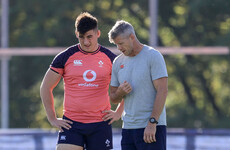This article by Gavin Cooney is available in full exclusively to The42 Members.
To get the full article directly to your inbox, join The42 Membership now at members.the42.ie or from the Membership tab in your iOS or Android app
I schlepped back out to the Main Media Centre in Qatar this morning to a technical briefing with Arsene Wenger and Jurgen Klinsmann, which reinforced the first rule of journalism: Always Turn Up.
It proved more newsworthy than I anticipated, when Wenger responded to a question on the impact of stunted preparation time by saying that the teams who did well in their opening games were those with experience but also those who “were mentally ready to focus on the competition and not on political demonstration.”
This line has been trotted out to mock Germany in particular, but it was jarring to hear a figure as respected as Wenger say it on stage. It’s also demonstrably false: the Australian players spoke as before the tournament, and went on to match their best-ever performance at the tournament.
But beneath the headline it was an interesting briefing, which looked at some of the tactical trends of the group phase.
The goals per game ratio in the group stage of this World Cup is very similar to its immediate predecessors. We’ve had 2.5 goals a game in Qatar, where the same figure was 2.54 in Russia and 2.83 in Brazil.
What has changed is how those goals are being scored. There has been a drop in the number of long-range strikes, with Klinsmann saying that teams are gumming up the centre of the pitch. The result has been to push the bulk of attacks to the flanks: 58% of all ‘entries to the final third’ (attacks to you and I) have come on the left and right wings. Citing these stats, Wenger said he believes the winner of the World Cup will be the team with the best wingers….
Don’t miss out on the rest of this exclusive article – The42 Members get this and all of our exclusive pieces delivered directly to their inbox. Join now at members.the42.ie or from the Membership tab in your iOS or Android app.












Fair play to mark travelling to listowel to train these guys. He really loves football
Huge congrats to Listowel Emmets, players, management and supporters.
Keep the dream going…
What is the “twinning” championship about?